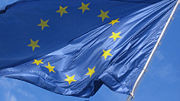EU Stronger From Economic Crisis

The Flag European Union is Based Upon A Painting Allegedly of Mary with a “Halo” of Stars
As I have mentioned before, various German leaders have indicated that the current economic crisis essentially will move the world to embrace the European financial system. The following news item this week also indicates that it seems to be making the EU stronger:
As Financial Crisis Grows, EU Emerges Stronger
Now, from Iceland to the Czech Republic, previously wary populations are warming to the EU, heaping praise on the very Brussels-based behemoth they had spent so many years deriding.
Denmark and the Euro Effect
The most obvious way the financial crisis has strengthened the image of the EU among the less-than-faithful is by making the euro look like a safehaven. Denmark, one of the few countries that deliberately opted out of the euro, may now be regretting its decision. As Danish prime minister Anders Fogh Rasmussen told fellow party members at an annual conference in October, “the current financial turmoil makes it evident that Denmark has to join the euro,” which he called a source of “political and economical stability.”
Like its Scandinavian neighbors, Denmark has long taken pride in maintaining a degree of independence from Brussels. But now it seems that many are coming around to the view of the Prime Minister who argues that “not being a euro member has its costs.”
For small countries like Denmark, those costs often come in the form of higher interest rates. Because Denmark keeps its currency pegged to the euro, in times of economic turbulence its central bank is forced to take drastic measures to prevent its local currency from depreciating. Right now, Danish interest rates stand at 5 percent, putting the country at a considerable competitive disadvantage to its neighbors in the euro zone countries, whose interest rates recently dropped half a point to 3.25 percent. Further cuts are expected…
Iceland ‘s New-Found Europhilia
Of all the countries on Europe’s periphery, perhaps none has experienced as pronounced a shift in EU sentiment as Iceland, a nation which, not coincidentally, also serves as Ground Zero for the financial crisis. Since January, Iceland’s currency has lost nearly half its value against the euro, plunging the country’s economy into chaos.
At the same time, opinion polling has registered a large shift in public attitudes toward the EU. According to a poll published on Nov. 24 by the Icelandic newspaper Frettabladid, 68 percent of Icelanders now favor joining the euro. Somewhat fewer, 59.6 percent, think the country should join the European Union, but that’s still an 11-point jump from September of 2007, when only 48.9 percent of Icelanders wanted EU membership…
The Celtic Tiger Loses its Claws
By rejecting the Lisbon treaty in a referendum in June, the people of Ireland brought the EU to its knees. Now, after a bruising ride on the financial crisis roller coaster, they might be the ones that get the EU back on its feet…
Why exactly the financial crisis would cause the Irish to reconsider isn’t entirely clear. Unlike Denmark and Iceland, Ireland is already a member of the euro zone. But Steven Collins, political editor for the Irish Times, says the financial crisis has “clearly” been the main factor in moving the debate. Just like in Iceland, the biggest movement in Irish opinion has been with the urban, educated middle-class. “It’s ironic, really,” Collins told SPIEGEL ONLINE, “because the working class are the ones losing their jobs, but it’s the middle class that is paying close attention to the crisis.” Although the urban middle-class tended to support the Lisbon Treaty before, they now do so in overwhelming numbers…
Ever Closer Union
The EU might not be out of the woods yet, but it is in a considerably stronger position heading into 2009 than many feared would be the case six months ago. http://www.spiegel.de/international/europe/0,1518,592953,00.html
I reported about Iceland here recently (Iceland Apparently Wants EU), but the situation with Denmark and Ireland are even more interesting because they are much larger nations. Actually, even when Ireland rejected the Lisbon treaty, I wrote that the Beast power would still form, but just with some modifications (see UCG, PCG, & LCG on the Irish Lisbon Treaty Rejection)–and it seems likely that I was correct in my assessment in July 2008.
The Living Church of God (LCG) also reported about Europe this week:
As LCG indicated, the truth is that the Europeans are prophesied to emerge as the major player on the world scene. And while multiple factors will contribute to it happening (probably also including policies of the next USA president), the fact is that Europe will be a strong, but fragile, union according to biblical prophecy.
Several articles of possibly related interest may include:
Europa, the Beast, and Revelation Where did Europe get its name? What might Europe have to do with the Book of Revelation? What about “the Beast”? What is ahead for Europe?
Who is the King of the North? Is there one? Do biblical and Roman Catholic prophecies point to the same leader? Should he be followed? Who will be the King of the North discussed in Daniel 11? Is a nuclear attack prophesied to happen to the English-speaking peoples of the United States, Great Britain, Canada, Australia, and New Zealand? When do the 1335 days, 1290 days, and 1260 days (the time, times, and half a time) of Daniel 12 begin? When does the Bible show that economic collapse will affect the United States?
Prophecies of Barack Obama? Are there biblical and non-biblical prophecies about Barack Obama. Did Nostradamus predict Barack Obama dealing with the Antichrist?
 |
Tweet |
|